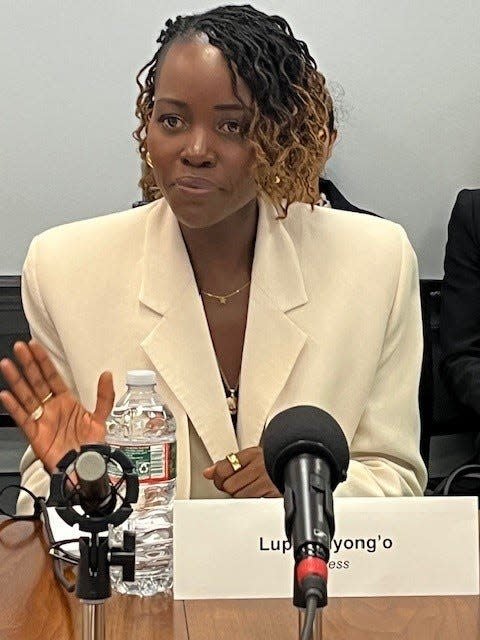Academy Award-winning actress Lupita Nyong’o has once again used her voice—not for a film role this time, but to speak up about a personal and pressing women’s health issue: uterine fibroids. Known for her powerful performances and graceful public image, Nyong’o recently joined the fight to fund fibroids research, sharing her own experience and calling attention to a condition that affects millions of women worldwide, particularly Black women.
Her words were heartfelt, raw, and brave: “I no longer want to remain silent.” In this article, we dive deep into what prompted Lupita’s involvement, what fibroids really are, why funding research matters, and how her voice might be the turning point in this neglected public health crisis.
What Are Uterine Fibroids?
Before understanding Lupita’s role, it’s important to know what uterine fibroids are. Uterine fibroids are non-cancerous tumors that grow in or on the uterus. While they are common—affecting up to 70% of women by age 50—they often go undiagnosed, ignored, or mismanaged due to a lack of awareness and medical research.
Common symptoms include:
- Heavy menstrual bleeding
- Severe cramps
- Pelvic pain or pressure
- Frequent urination
- Pain during intercourse
- Infertility or complications during pregnancy
For some women, fibroids cause only mild discomfort. But for others, the symptoms can be life-altering, even debilitating.
Why Lupita Nyong’o Is Speaking Out Now
Lupita Nyong’o, known for roles in 12 Years a Slave, Black Panther, and Us, recently revealed her personal struggle with fibroids during a moving public appearance at a women’s health summit in New York City. With raw emotion, she recounted her journey: the confusion, the pain, and the silence she maintained for years.
“I went from doctor to doctor, and for a long time, I didn’t have a name for what I was feeling. It was exhausting. It was scary. It was lonely,” she said.
Her statement, “I no longer want to remain silent,” reflects not only her own awakening but also the need to break the taboo that surrounds reproductive health issues—especially in the African and African-American communities.
Lupita Nyong’o Fibroids Research Campaign: The Goal

Nyong’o has partnered with advocacy organizations like The White Dress Project and The Fibroid Foundation to call for increased fibroids research funding, better treatment options, and more education about the condition. One major push is for the U.S. Congress to support the Uterine Fibroid Research and Education Act, which would allocate federal funds toward understanding and treating fibroids.
Her involvement includes:
- Public speaking engagements
- Social media campaigns to raise awareness
- Meetings with lawmakers and health officials
- Documentary support to highlight real women’s stories
By putting a globally recognized face to the cause, Lupita is helping drive national and international conversations around a disease that has long been overlooked.
Why Fibroids Research Is Urgently Needed
Despite their prevalence, fibroids receive only a fraction of the funding dedicated to other women’s health conditions. In fact, experts have noted that fibroids research has been historically underfunded due to:
- Gender bias in medical research
- Racial disparities in healthcare
- Stigma around menstrual and reproductive issues
Key statistics:
- Black women are 3 times more likely to develop fibroids than white women.
- They are more likely to experience severe symptoms at a younger age.
- Over 200,000 hysterectomies in the U.S. each year are due to fibroids.
- Many women resort to surgery because non-invasive treatments are either inaccessible or ineffective.
This is why Lupita Nyong’o fibroids research advocacy is so crucial—awareness is the first step toward progress.
The Cultural Silence Around Women’s Pain
One of the most powerful parts of Lupita’s statement is her call to end the silence. For generations, women—especially women of color—have been taught to “tough it out” when it comes to menstrual pain or reproductive health issues. Talking about periods, cramps, or pelvic pain is still considered taboo in many communities.
Nyong’o’s decision to speak up helps break down that wall of silence. She said:
“There’s a culture of enduring pain quietly that we need to break. We shouldn’t have to suffer in silence. We deserve answers. We deserve options.”
Her words echo a growing movement where women are reclaiming their voices to demand better healthcare and greater respect in medical spaces.
Celebrities Joining the Cause
Lupita isn’t the first public figure to speak out about fibroids, but her involvement adds major momentum to the cause. Other celebrities who have previously shared their fibroids stories include:
- Tia Mowry, actress and TV personality
- Tamron Hall, journalist and talk show host
- Gabrielle Union, actress and activist
Together, these voices are helping to de-stigmatize uterine health and push for legislative and social change.
The Role of Social Media in the Fibroids Awareness Movement
Social media has played a significant role in amplifying voices like Lupita’s. On platforms like Instagram and X (formerly Twitter), thousands of women are now sharing their fibroids stories using hashtags such as:
- #FibroidsAwareness
- #SayTheirNames
- #EndFibroidSilence
- #LupitaForFibroids
Lupita has used her social platforms to share educational content, highlight other women’s experiences, and encourage people to donate to research initiatives. Her efforts are not just performative—they are activist-driven, focused on real-world impact.
What Needs to Happen Next?
Nyong’o’s involvement has sparked a larger conversation, but real change requires more than headlines. Here are some key steps needed moving forward:
1. Increased Federal Funding
The Uterine Fibroid Research and Education Act must be passed and fully funded. This will support medical research into causes, treatments, and prevention strategies.
2. Better Training for Doctors
Medical professionals need better education on how to diagnose and treat fibroids early—without defaulting to extreme surgeries like hysterectomies.
3. Expanded Treatment Options
More investment is needed in non-invasive treatments like MR-guided focused ultrasound, hormone therapies, and other innovative solutions.
4. Education and Outreach
Public campaigns can help remove the shame and silence surrounding fibroids. Schools and community centers should include uterine health in their wellness programs.
5. Diversity in Clinical Trials
Black and brown women must be included in clinical research to ensure that treatments are effective across different populations.
A New Chapter in Women’s Health Advocacy
Lupita Nyong’o fibroids research efforts mark the beginning of a new chapter in women’s health advocacy. By sharing her personal journey, she is not only humanizing the condition but also giving voice to millions of women who have long suffered in silence.
Her courage serves as a reminder that celebrity influence, when used with purpose, can bring light to neglected issues and drive powerful social change. And while Lupita may be known for playing fierce characters on screen, it’s clear that her most powerful role yet might just be the one she’s playing in real life—as a fearless advocate for women’s health.
Final Thoughts
Uterine fibroids may not be a glamorous topic, but thanks to voices like Lupita Nyong’o, the conversation is finally getting the attention it deserves. As more people come forward, and more funding becomes available, there is real hope that future generations of women won’t have to suffer in silence.
Read Next – Trump Epstein Controversy Reignites: Dems Claim Voter Deception






